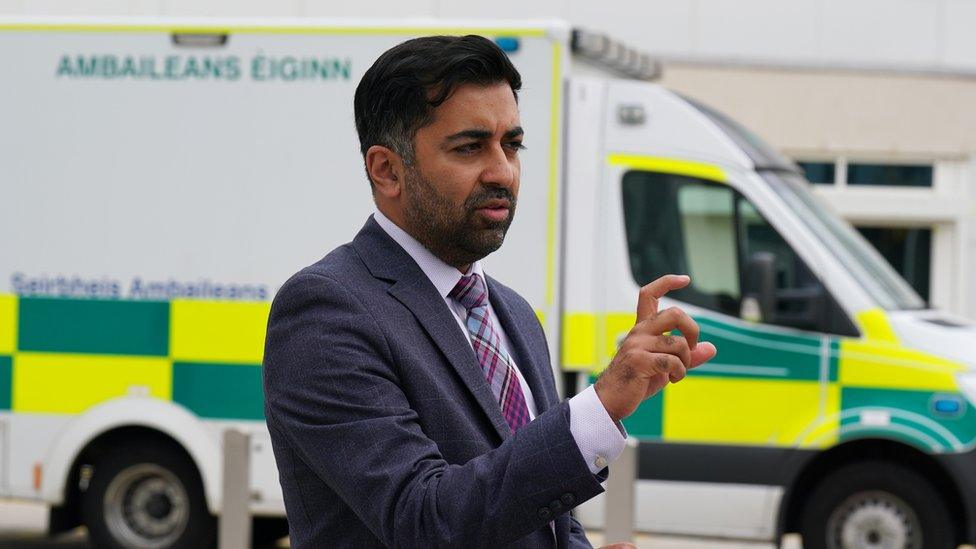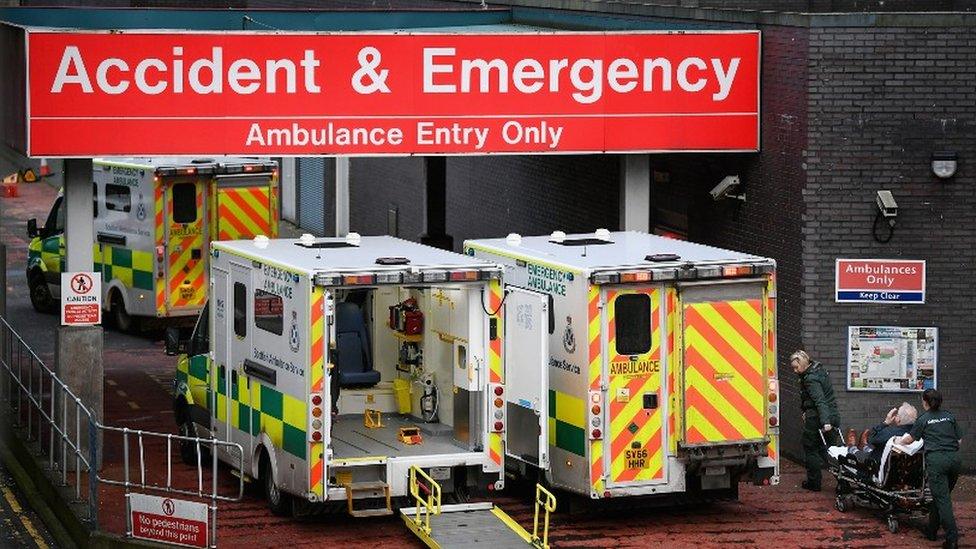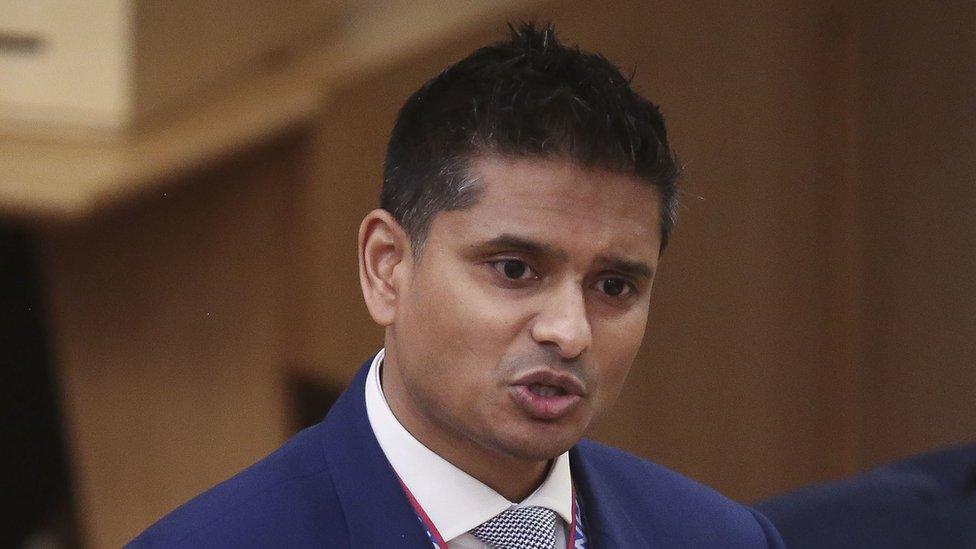Health Secretary Humza Yousaf expects immediate A&E improvement
- Published

Scottish Health Secretary Humza Yousaf says the latest figures are unacceptable
Scottish Health Secretary Humza Yousaf expects to see an "immediate" improvement in A&E waiting times after they hit the worst level on record.
New figures show, external 63.5% of patients were dealt with within four hours – well below the government's 95% target.
Mr Yousaf said he expected to see the statistics rebound when new figures are published next week.
Scottish Tory health spokesman Dr Sandesh Gulhane said he was "outraged" by the government's response.
Figures for the week ending 11 September showed just 63.5% of patients attending A&E were seen and subsequently admitted or discharged within four hours. The Scottish government target is 95%.
One medic warned that such delays could lead to the loss of about 40 lives.
Mr Yousaf singled out three sites – the Forth Valley Hospital in Larbert, the Royal Infirmary in Edinburgh and the Queen Elizabeth University Hospital in Glasgow – as having performed particularly poorly, while acknowledging that the low figures were "across the board" in all parts of Scotland.
"That level of performance that we saw over the weekend of 11 September was just not acceptable and those health boards know that I expect immediate improvement," he told BBC Radio's Good Morning Scotland programme.
He said capacity in hospitals was the principal reason for the A&E waiting times.

He also cited recruitment issues and pressures in the social care system, including rising energy bills making it harder for care homes to run their businesses.
"Because of those issues, that means that demand at the front door [of hospitals] increases and also makes it more difficult to get those delayed discharges out the back door which means that capacity is actually the most significant issue that we're facing," Mr Yousaf said.
"Length of stay is also a problem. People are sicker."
The SNP minister explained hospital patients were staying on average a day longer than in previous years.
"That might not seem like a lot. But times that by the 22,000-odd people that attend A&E in any given week and that adds up very quickly."
'Exceptionally difficult winter'
The health secretary said he hoped to set out an NHS action plan to parliament within the next fortnight.
He will set out measures to increase the NHS workforce and to invest in social care to tackle delayed discharges.
"We are anticipating an exceptionally difficult winter, because we expect we might get a resurgence of flu which we haven't seen in the last couple of years," Mr Yousaf said.
He added that there was a "high possibility" of another Covid-19 wave, as well as expected injuries from slips, trips and falls in colder conditions.
He pointed to his government's efforts to recruit further staff, with 200 nurses brought in from overseas last year.
And in efforts to retain staff, he said he was meeting soon with trade unions representing NHS staff to get a pay deal "over the line".
"I don't begrudge trade unions for asking for more than 5% given where we are with the cost-of-living crisis," Mr Yousaf said.
"Equally of course I have to be really upfront that any additionality to 5% is going to have to be found within my health budget and that means having to take money away from other crucial services and that can be really difficult."
Although he is facing criticism over NHS waiting times, the health secretary said he would not scrap the targets altogether.

Performance on waiting times targets at Scotland's hospital A&E units has hit a new low.
This came after it was reported new UK health secretary Therese Coffey was considering axing the figures as part of her "emergency" NHS plan.
"They keep government focused," Mr Yousaf said. "I think scrapping them is the wrong move."
Dr Gulhane, Scottish Conservative health spokesman, said he was "alarmed" by Mr Yousaf's response to the record-low figures.
He pointed to the health secretary's warning that people are staying in hospital an extra day longer on average because they were "sicker".
"That's because people are waiting so long to get seen by their GP," Dr Gulhane said. "They're waiting to get seen in outpatients. They're not having their operations, they're in more pain.
"Of course they're going to be sicker. It's because of the long waiting times."
He called for the government to increase pensions to help increase the number of doctors and nurses in the NHS, as well as freeing up cash to recruit more staff.
Dr Gulhane said recruitment had done little to plug a gap of 6000 nursing vacancies.

Scottish Conservative health spokesman Dr Sandesh Gulhane has called for action from the government
He added: "The reason I'm outraged, the reason I'm so upset about this is because people are suffering.
"People are actually dying for no reason because they are waiting in A&E."
Dr John-Paul Loughrey, of the Royal College of Emergency Medicine Scotland, said the latest delays could lead to about 40 deaths in the following 30 days.
He told BBC Scotland: "What we have now is full hospitals resulting in full emergency departments and that pressure backwashes through the emergency department meaning we can't offload ambulances in time.
"So what we end up with are large number of patients spending excessive times in emergency departments which we know is very harmful to patients in terms of an increased risk of death at 30 days.
"Also it is an increase in the amount of burnout and attrition of our staff. This is harmful to patients, it is harmful to staff and we really need urgent action to correct this."
He explained that studies suggested a mortality rate of one patient for every 82 who spend more than six to eight hours in an emergency department.
"In Scotland there were about 3,400 patients who spent more than eight hours in an ED (emergency department) in the week-ending statistics we've just seen which means that we could estimate that 40 additional lives will be lost because of these delays, within the 30 days."